‘Experiment I’ turns a literary event into performance art
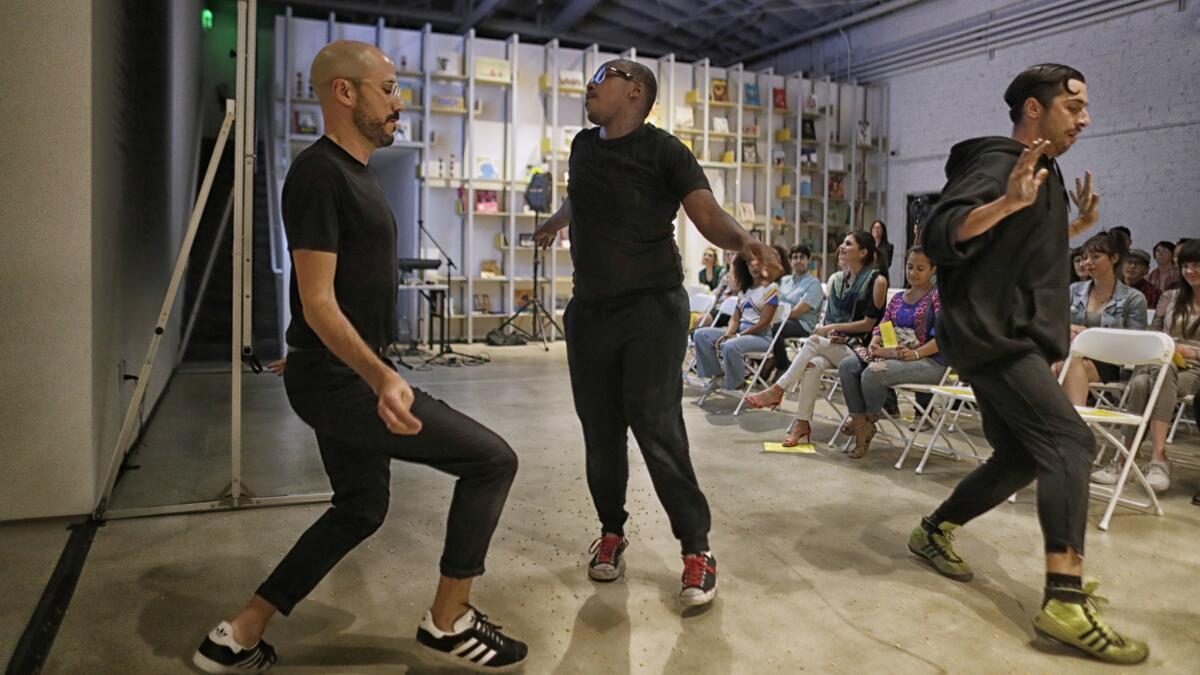
- Share via
Live, unabashed nudity is, perhaps unsurprisingly, a rarity at public literary events. Dance, performance art, wigs, one-liners, keyboards, skateboards, popcorn, dental floss, video loops, audience participation, and even, quite frankly, unfettered joy, also make infrequent appearances on the reading circuit, but Sept. 29 at the newly opened Institute of Contemporary Art, Los Angeles, a free event called “Experiment I” managed to contain all this and more.
“People want a playful outlet,” said event curator Michelle Tea, author of cult favorite memoirs “Valencia” and “Rent Girl,” and most recently “Modern Tarot.” As a founding member of the long-running Sister Spit poetry tour, she has curated literary happenings since 1994.
“I like to be surprised and entertained,” she said. “I like to challenge myself and challenge my writer friends to do something different.” Tea billed “Experiment I” as a compilation of “unexpected readings and performance … intended to inspire new thoughts, humor and daredevilry.”

A game of truth or dare initiated by comic Lizzy Cooperman provided perhaps the most direct response to daredevilry, but a presentation from Pave the Way Skateboards, represented by Tara Jepson and Miriam Klein Stahl, author of “Like a Dog” and illustrator of “Rad Women Worldwide,” respectively, saw Jepson wheel across the museum floor to read a queer skateboarding manifesto in heels and tights. Wendy. C. Ortiz, who describes her latest book, “Bruja,” as a “dreamoir,” dared the audience to reveal who among us had dreamed of alligators or matricide. The evening’s opener, the Brontez Purnell Dance Company, performing a partially unclad piece called “Chronic: A Dance About Marijuana,” dared the audience of roughly 50 people to settle in for an experimental experience and open our minds.
“Hold on to your hats and whatever other accessories you happen to be wearing,” Tea told the audience as the performance began, but for Brontez Purnell, author of “Since I Laid My Burden Down,” and the rest of the troupe, those clothing-on rules did not apply. The dancers began in witchy black wigs like the three weird sisters, and made excellent use of ICA’s three connected rooms, beckoning the crowd to follow them around corners and back again.
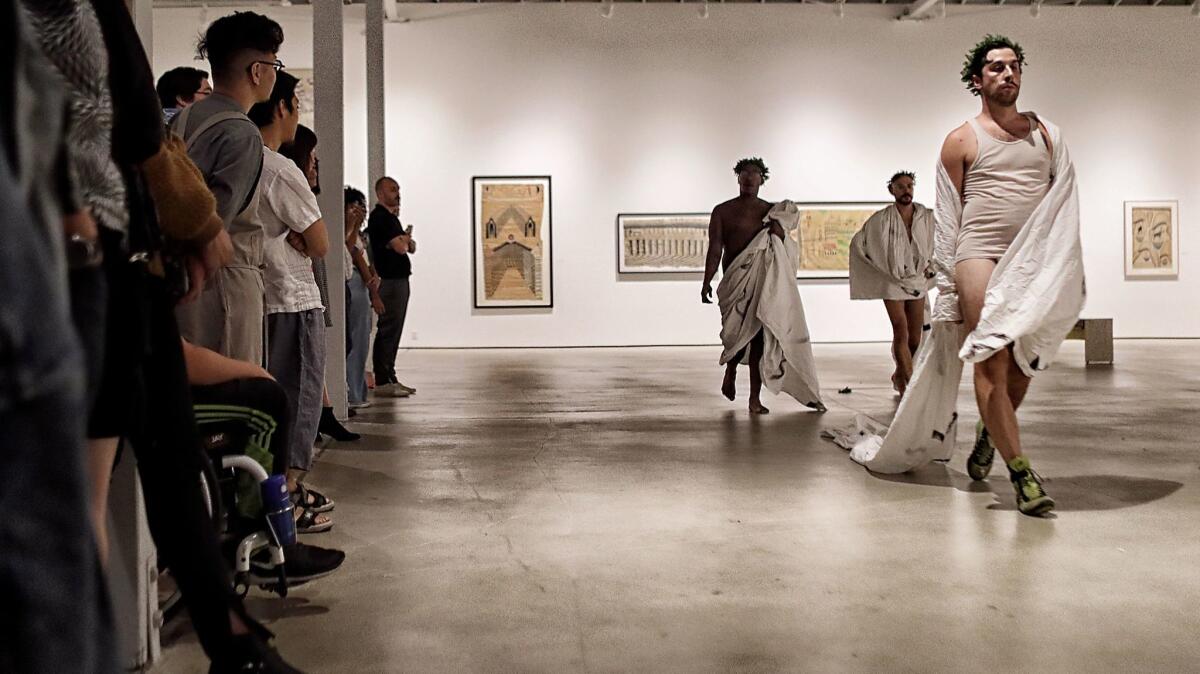
The sound of popcorn kernels raining from the dancers’ hands onto poured concrete was as dramatic as a broken string of pearls, and later, when they bathed themselves in a popped batch, the smell of buttery popcorn drove the message home: in “a dance about marijuana,” this was the munchies portion. (A loop of Ice Cube and Chris Tucker in “Friday” playing behind them was an inspired touch.) Post-popcorn, in the large main gallery, the dancers unspooled a web of dental floss from their mouths, a giant cat’s cradle that connected them to one another, stretching farther and farther like the string of a kite. The performance was thrilling, and intentionally scented here, too. Mint floss — evoking green, like marijuana, Purnell later explained, “was a stylistic choice.”
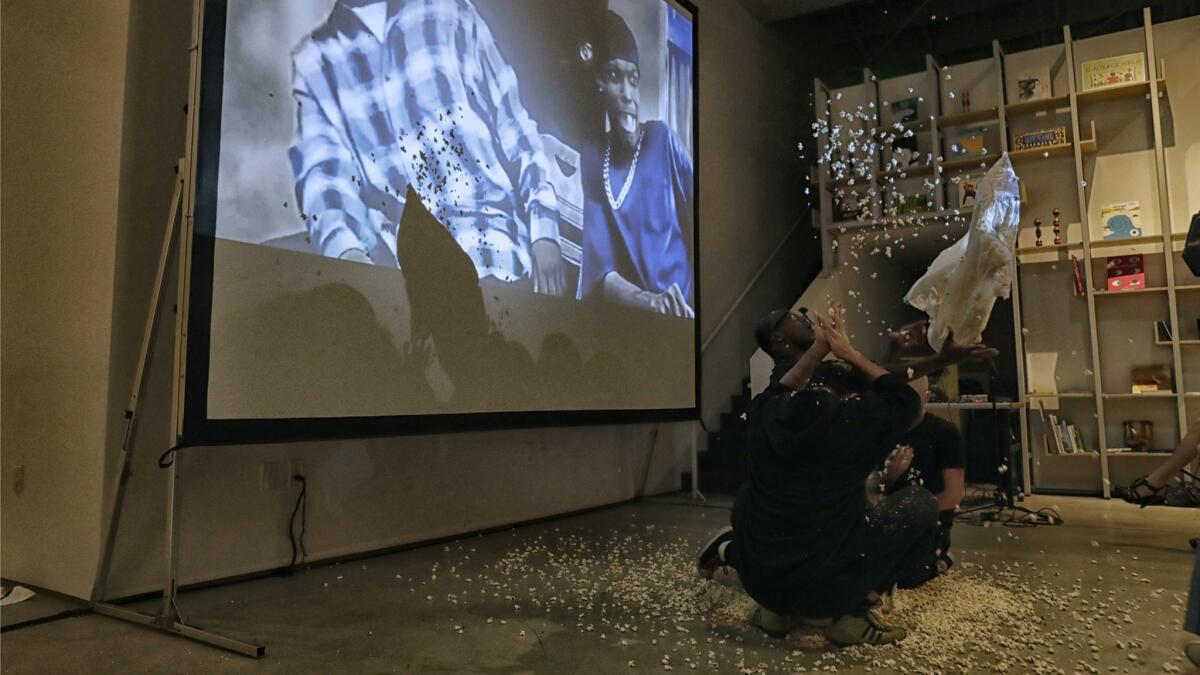
Wendy C. Ortiz followed, reading from “Bruja” — but with a twist. “I’m a psychotherapist, so I use the word ‘experiment’ a lot,” she said of the evening’s theme. “If it fails, it’s still good. I love the word ‘experiment.’” Ortiz encouraged audience members to raise their hands if they too had dreamed of the images described in her entries, at which point her daughter presented them with a wisteria pod collected from their backyard. “They feel like velvet,” said Ortiz, introducing a tactile element to the event.
Dreams of cats, seals, sharks and even matricide all had multiple takers; befitting of current events, bombs were perhaps the most commonly shared dream. The ICA is white-walled and well-lit, which exposed the audience and made raising our hands feel vulnerable, but there was something touchingly intimate about looking around to discover which strangers had dreamed of tidal waves too.
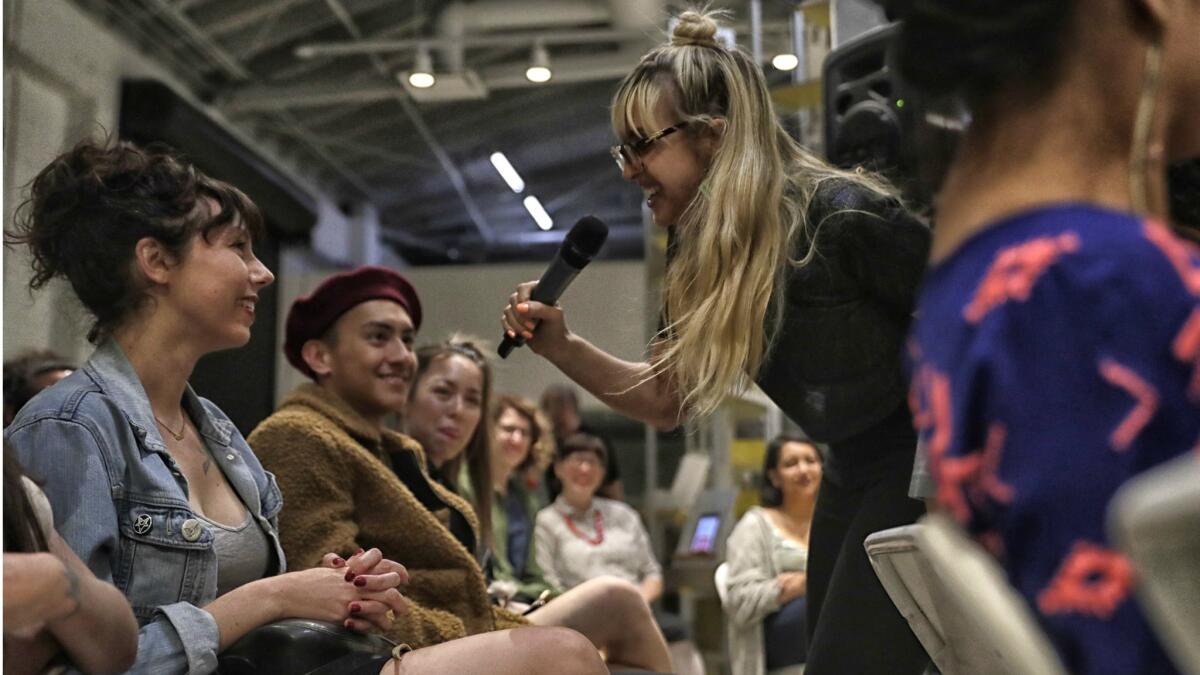
During her set, stand-up comedian Lizzy Cooperman often stood behind a keyboard, which she used to punctuate her jokes with ominous organ notes — the discordance between her dire score and the audience’s laughter was funny in and of itself, stoking the audience more and more. “Nothing elicits more rage in me than an invitation for an evening of crafting,” she said, slamming her hands down on the keys. “I get these emails, like, ‘Hey lady, come over on Tuesday. Bring scissors and glitter and let’s sit around and die!’” she yelled over a funereal note, adding, “and they’re not even spelling it right! They’re spelling it DIY.”
Cooperman clearly knew her audience, delivering jokes in a theatrical old crone voice, playing truth or dare with the crowd and giving us the opportunity to laugh at ourselves. “I just want to explore the boundaries!” she screamed, “’Cause I’m so sex positive!” At times, laughter nearly drowned out her keyboard. No drink minimum necessary, Cooperman killed.
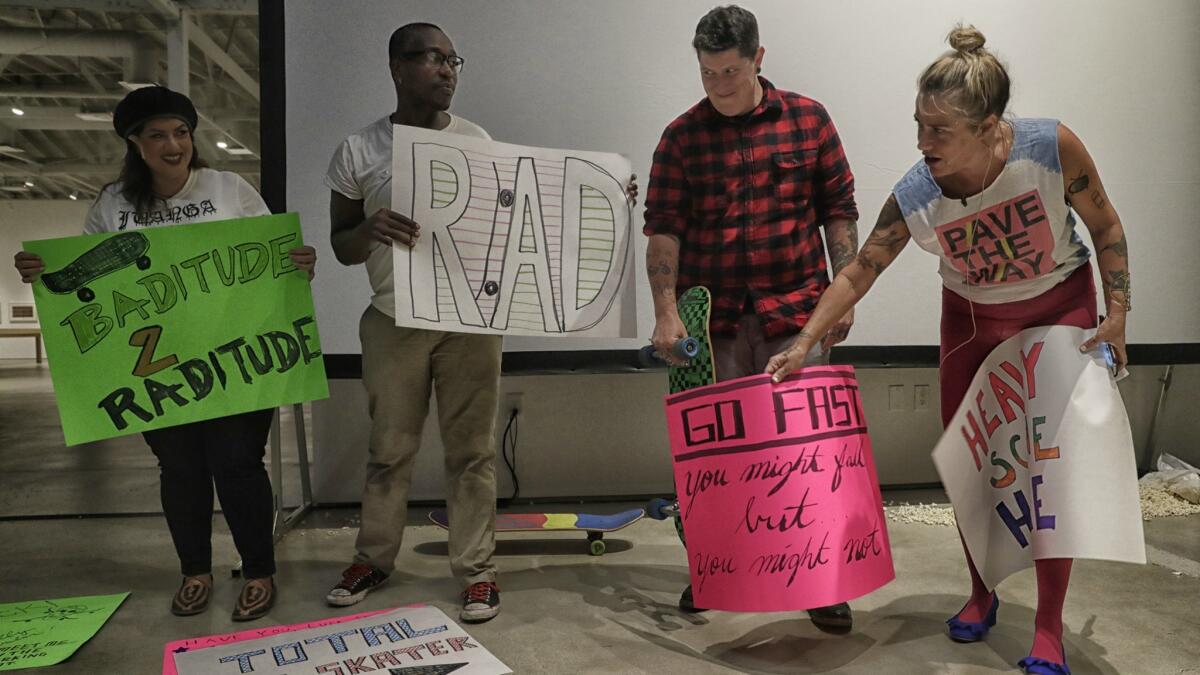
“Are we not punks? Do we not value energy over Juilliard training?” These were the questions posed by Jepson in Pave the Way Skateboard’s queer skateboarding manifesto, the final performance of the night. “As queer skateboarders we believe … that part of dismantling toxic hierarchies and undermining patriarchy is creating an even playing field for all skill sets and abilities, and learning to value the energy, or ‘stoke,’ a person brings to their skateboarding,” read Jepson to snapping and affirmative applause. She looked up, remarking, “This is what it feels like to run a superchurch.”
The manifesto embodied the ambitions of not only Pave the Way, but of “Experiment I.” A skate video intercut with Miriam Klein Stahl’s illustrations of writers such as Adrienne Rich and Audre Lorde screened in the background, and Stahl invited a friend to read from Sophie Scholl’s entry in “Rad Women Worldwide.” Audience members took the stage to pose for Instagrams with Pave the Way decks and poster-board signs bearing encouraging slogans like “go fast, you might fall, but you might not” and “baditude 2 raditude,” whether or not they could skate. “All interested parties belong on a skateboard,” Jepson said.
That sentiment was echoed by attendee Antonio Rodriguez after the event, who said, “every citizen in this city should be comfortable walking into a museum.” He hadn’t been to many traditional readings of late, but was intrigued by this one, explaining, “I love when media crashes into each other.”
Another audience member, Lexi Welch, had read Purnell’s novel, and admitted that straightforward readings “can be hard to get into.” She prefers the energy of performance, and was glad that the Brontez Purnell Dance Company had kicked the evening off. “After they’re confronted with performance,” she said, “people tend to be a lot more open.”
As the crowd filed out, Tea swept up leftover popcorn, like confetti after a party, with a push broom.
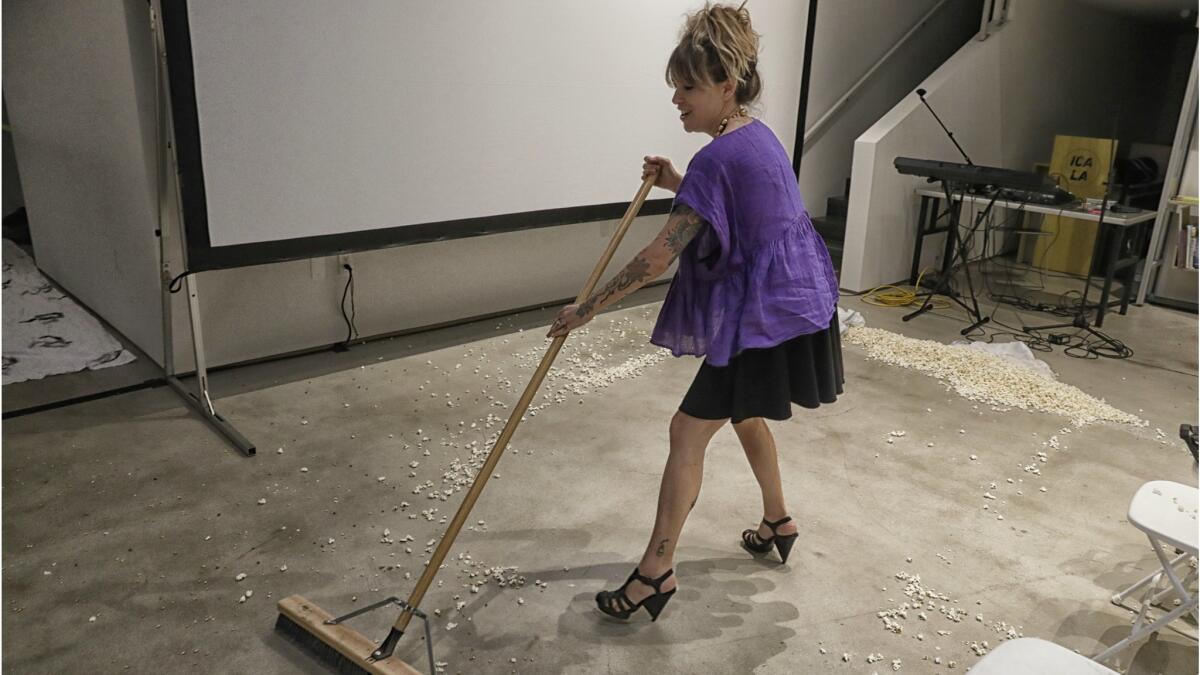
More to Read
Sign up for our Book Club newsletter
Get the latest news, events and more from the Los Angeles Times Book Club, and help us get L.A. reading and talking.
You may occasionally receive promotional content from the Los Angeles Times.








